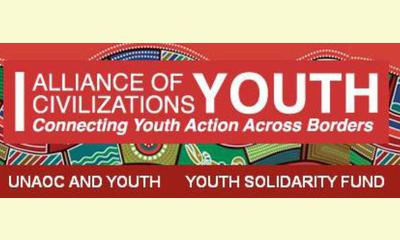|
|
Youth Recommendations at the UNAOC Forum in Vienna
un article par Isabelle, Alliance of Civilizations Youth
150 youth from 100 countries convened at the Alliance of Civilizations Forum in Vienna on February 26, 2013. After a full day of engaging and dynamic discussions and exchange, they made the following recommendations:

click on photo to enlarge
Concerning religion and law,
· We recommend the inclusion of ethical, religious and spiritual teachings in both formal and non-formal education, and the reinforcement of the rights of freedom of conscience, thought, religion, religious practice, faith, spirituality and its protection on state and public levels.
In terms of religion and education,
· We request Member States to invest in both formal and non-formal education, including the training of teachers regarding diversity and tolerance and strongly encourage strengthening the relationship between youth and decision makers at all levels.
· Recognizing the importance of social media, having transformed media from monologue to dialogue, we recommend stakeholders to provide workshops to train young leaders on how to use social media wisely.
· Since free access to information is a key element for high quality media work and democracy, encouraging a dialogue between governments and civil society through decentralized inclusive decision making and information systems, sharing best practices and expertise.
To foster Diversity in Media, we recommend Stakeholders to help cultivate a plural society through the promotion and support of culturally diverse arts and encourage the creation of training programs for minorities in journalism, arts and media.
To shape a New Narrative on Migration, we request the formation of a task force including all stakeholders — especially migrants — to develop practical solutions through a multi-perspective approach to depoliticize the narrative of migration.
We also encourage Member States to ease the process of acquiring citizenship.
To share best practices in Integration, we encourage states to create a polylogue between various stake holders with an aim to enhance political and active participation of minorities in society to ensure and create long term social inclusion and integration. This can be achieved by including migrant stories in the political discourse of host nations, by sharing best practice outreach, affirmative programs and actions
To cross language divides and create a sense of community, we recommend providing children with free education both in their mother tongue and the lingua franca spoken in the respective region/country, the creation of an international open-source platform where migrants can share their experiences, needs and best practices to achieve mutual benefit and guaranteeing equal and free access to quality language education for refugees, asylum seekers and migrants, regardless of their legal status.
We invite you to take our recommendations into account in your work and actions.
|








|
DISCUSSION
Question(s) liée(s) à cet article:
Is there a renewed movement of solidarity by the new generation?,
* * * * *
Commentaire le plus récent:
from Javier Collado Ruano, Director of Edition at Global Education Magazine, on the occasion of the International Day of Solidarity.
Solidarity is a trans-dimensional phenomenon that goes beyond the ontological essence of human nature. In fact, when we analyze the connections between the microcosm and the macrocosm, we perceive that human beings are not involved in chaos and arbitrariness, but belongs to the large network of interdependencies, complementarities and reciprocities that constitute life. The emergence of life on Earth, around 3,8 billion years ago, was a complex process of exceptional natural phenomena, inherent in all living systems. A process which is expressed through unlimited creativity: mutation, gene exchange, and symbiosis. From a cosmo-biological perspective, we can understand a new conceptual dimension of life, where all living beings share same basis of genetic code: the twenty amino-acids and four phosphatic bases. In fact, the diversity of living beings is caused by the combination of this cosmo-bio-genetic basis.
This trans-dimensional perspective has a deep ecological and spiritual sense for our worldview because the human evolutionary adventure is the latest stage of life on Earth. The modern human being is a vertebrate animal, mammal, belonging to the primates, which emerged 200,000 years ago. In recent centuries he has imposed its anthropocentric, industrial and capitalist vision to the detriment of Pachamama (and Indigenous goddess known as earth mother). We consume around 120% of the natural resources that Earth Mother regenerats annually. Our consumer behavior is immersed in a fatalistic dynamic with a destiny to climate change (deforestation, loss of biodiversity, ozone, etc.), and our own self-destruction as a species.
There is an urgent need to get beyond the cognitive fallacy that the mental structures of social Darwinism and capitalist postulates of the 19th century have historically constituted, because they only understand natural and social systems as warmongers and competitive processes whereby species diverge from each other. . ... continuation.

|
|








